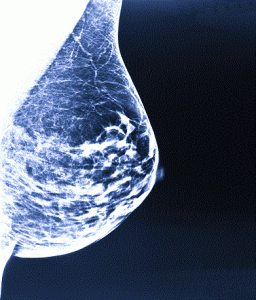 Substantial progress has been made in the targeted therapy of breast cancer, with three new targeted therapies licensed for advanced breast cancer over the last two years. Targeted therapies block the growth and spread of cancer by interfering in specific biological processes responsible for cancer cell growth. Therefore targeted therapies may be more effective and less harmful to normal cells than other cancer treatments, such as traditional chemotherapy that targets all rapidly dividing cells. The most well known targeted therapy at the moment is trastuzumab (Herceptin).
Substantial progress has been made in the targeted therapy of breast cancer, with three new targeted therapies licensed for advanced breast cancer over the last two years. Targeted therapies block the growth and spread of cancer by interfering in specific biological processes responsible for cancer cell growth. Therefore targeted therapies may be more effective and less harmful to normal cells than other cancer treatments, such as traditional chemotherapy that targets all rapidly dividing cells. The most well known targeted therapy at the moment is trastuzumab (Herceptin).
A new thematic series in Breast Cancer Research brings together the translational research behind these new approaches, as well as reviewing treatments with early evidence of efficacy that are still in clinical development. Edited by Prof Jenny Chang (Methodist Cancer Center, USA), the special series showcases the advances in our understanding of breast cancer that has driven this therapeutic progress.
mTOR inhibitors
In the series, Fabrice Andre (Gustave Roussy Institute, France) reviews the clinical development of mTOR inhibitors in breast cancer treatment. The mammalian target of rapamycin (mTOR) pathway is a central pathway that is involved in malignant transformation, and several randomized trials have shown that the use of mTOR inhibitors could improve patient outcome with hormone receptor-positive (HR+) or human epidermal growth factor receptor-2-positive (HER2-) breast cancers. Andre analyzes new perspectives from these trials and discusses how findings from these studies will provide indispensable tools for the design of future clinical trials.
Immunotherapy
Giuseppe Curigliano (European Institute of Oncology, Italy) explains the importance of exploring the immune system in both research and clinical settings, since its role in defining breast cancer behavior is proving to be a significant factor. Curigliano reviews the current information and the future perspectives of immunotherapy in patients with breast cancer, including the prognostic role of tumor infiltrating lymphocytes, immune signatures, targeted therapies modulating the immune system and tumor antigens cancer vaccines.
T-DM1 mechanism and resistance
Mark Barok (University of Helsinki, Finland) discusses the mechanism of action and potential resistance mechanisms of trastuzumab emtansine (T-DM1). T-DM1 is an antibody-drug conjugate that is effective and generally well tolerated when administered as a single agent to treat advanced breast cancer, and is currently being evaluated as an adjuvant treatment for early breast cancer. Barok reviews the strategies to overcome resistance to T-DM1, which are important for its therapeutic success.
View the series so far here.
Breast Cancer Research welcomes submissions of preclinical research manuscripts to the series that describes data that is anticipated to lead to a clinical trial, as well as analysis of clinical trials. The publication of research articles in this special series will be co-ordinated with the series of commissioned reviews and opinions, written by leaders in the field including Weimin Fan, Richard Finn, Andrew Tutt and Edith Perez.
The deadline for research submissions is 30th April 2014. Please submit online and indicate in your covering letter that you would like the article to be considered for the breast cancer treatment series.
For further information about the journal, please visit the website, or contact us for enquiries about the special series.
Breast Cancer Research is the leading breast cancer research journal in the oncology field (Journal citation reports), with an Impact Factor of 5.87. All of the research articles in Breast Cancer Research are open access. To access all subscription content, including peer-reviewed reviews, editorials and viewpoints, register for a free trial to the journal. To keep up to date with the latest articles published in the journal, sign up for Article Alerts.

Comments